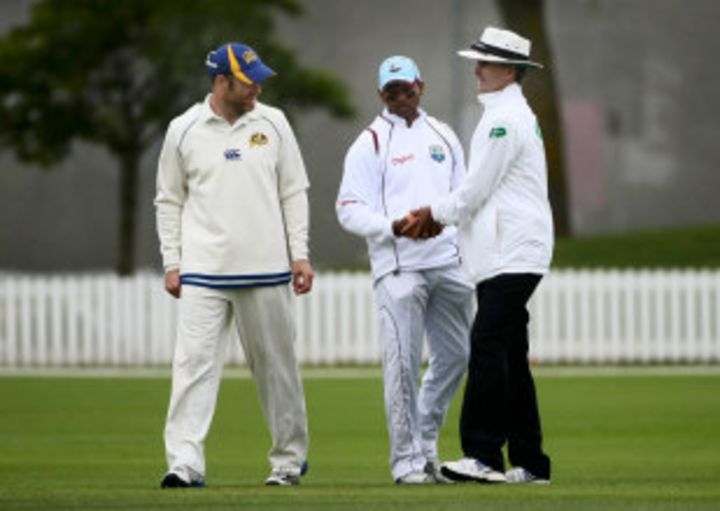A fight to rise above mid-table mediocrity
New Zealand and West Indies, who should be evenly matched, will fight to rise above low-to-mid table mediocrity

A feisty Ashes series is well underway across the Tasman. India will shortly arrive in South Africa, albeit for a tour far shorter, and less worthy, than it should be. Sri Lanka are soon to play Pakistan in the UAE in a contest that should determine who is second-best from the subcontinent. And here in New Zealand the hosts are about to face West Indies. It's a madly busy time in the international calendar. All that is missing for a full set is Zimbabwe to be playing Bangladesh.
This series, which begins in Dunedin on Tuesday, does not have the history of Australia-England, the politics and glamour of South Africa-India or the battle for bragging rights between Sri Lanka and Pakistan. What it does have is two sides, which should be evenly matched, fighting to rise above low-to-mid table mediocrity. If Test cricket was ever to be two divisions this, currently, is a second-division fixture.
New Zealand have not won a Test this year, although they came within one wicket of a famous victory against England in Auckland, having previously plumbed the depths of 45 all out in a session in Cape Town. Their upward curve from that nadir has stalled, though, since coming agonisingly short against England. There was an unsurprising reversal on the return tour - which included being humbled for 68 at Lord's - and underwhelming performances in Bangladesh recently.
In March, West Indies completed their sixth straight Test victory when they cleaned up a hapless Zimbabwe but any sense of mild rejuvenation brought about by that run of success was shattered by the two performances in India. Nobody expected them to win, but it was the lack of spine, the lack of fight, that was most alarming. They played like many thought they were: the people to make up the numbers at Sachin Tendulkar's farewell.
Perhaps coming into a contest where they know they start closer to an even keel will enable a better mindset. One thing is clear. Something needs to change because at stages in India they became an embarrassment. They are a side with a host of issues to confront, and their collective performance is just one of them. There is the cloud hanging over Shane Shillingford after he was reported, again, for a suspect action. So, too, was Marlon Samuels, but West Indies can live without his bowling if the worst was to happen for him.
Then there are the injuries. Kemar Roach's absence is a significant blow which robs the attack of an incisive weapon and a talisman. For all of Tino Best's bluster, his results are rarely as compelling as Roach's. Shannon Gabriel, who impressed on his Test debut at Lord's in 2012 before succumbing to injury, and Shannon Cottrell remain raw and liable to release any pressure created while the debate continues around Darren Sammy's role.
Chris Gayle's hamstring strain removes someone with a fine record against New Zealand - he averages 75 - and who still, when the mood takes him, which it certainly didn't appear to in India, can dominate a Test like few others. It also means his 100th Test, which was set to be in Dunedin, will have to wait as, too, will further examination of how motivated Gayle remains for the longer format.
If the pitches are similar to the ones during the England tour earlier in the year it will be hard work for the quicker bowlers, especially when the Kookaburra stops swinging after 20 overs (if it has even done it for that long). Swing is not really a natural attribute for any of the West Indies bowlers. That factor gives New Zealand an early headstart.
They have a solid collection of fast bowlers, led by Tim Southee and Trent Boult, and backed up by the tireless Neil Wagner. Doug Bracewell remains infuriatingly inconsistent. Southee and Boult will be eager to exploit a West Indies top order where footwork is not always to the fore; do not be surprised to see Samuels and Shivnarine Chanderpaul together at 50 for 3. This is a crucial tour for both Kieran Powell and Darren Bravo, batsmen who have, on occasion, shown the application for Test cricket. Last year Powell made three hundreds in six innings, including two in a match against Bangladesh, but found the habit of wasting starts in India.
Not that New Zealand's batsmen can sit back and ponder how great life is. Hamish Rutherford has not passed fifty since his debut 171 against England, while as soon as the ball moves off the straight Peter Fulton is an outside edge waiting to happen. Ross Taylor needs to deliver more than flashy fifties. Like West Indies, though, the alternatives are not screaming out to be selected.
West Indies claimed the previous series between these teams, in the Caribbean, but at home New Zealand hold the aces. They have not lost on their soil to West Indies since an innings-and-322-run drubbing in 1995 in Wellington, although the irregularity of the meetings means there have only been seven Tests since with the last three draws. There will be a survivor from that 1995 encounter appearing in Dunedin; Chanderpaul was in his second year of Test cricket then. He is still going. You sense that if West Indies are to prevail this time he will need to play a big hand.
Andrew McGlashan is an assistant editor at ESPNcricinfo
Read in App
Elevate your reading experience on ESPNcricinfo App.